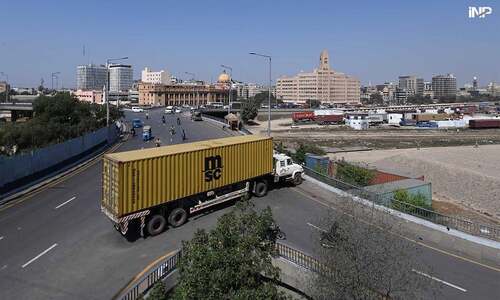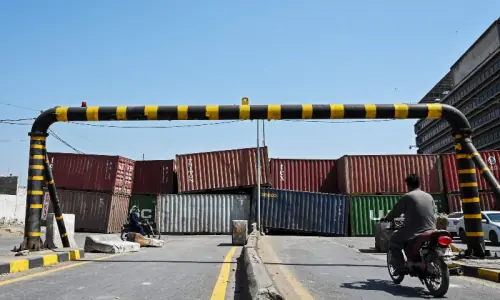 KARACHI, Aug 1: Chief of Naval Staff Admiral Shahid Karimullah has said that Pakistan Navy has been vigorously pursuing the case with the government for extension of continental shelf from 200 to 350 nautical miles for which the claim is to be submitted by May 2009 in accordance with provisions of UN Conventions on Laws of Seas (UNCLOS) 1982.
KARACHI, Aug 1: Chief of Naval Staff Admiral Shahid Karimullah has said that Pakistan Navy has been vigorously pursuing the case with the government for extension of continental shelf from 200 to 350 nautical miles for which the claim is to be submitted by May 2009 in accordance with provisions of UN Conventions on Laws of Seas (UNCLOS) 1982.
Chief of Naval Staff, who is also the Advisor to the President on Maritime Affairs, said that total area of Pakistan’s Exclusive Economic Zone is larger than the combined land area of Sindh and NWFP and can rightly be regarded as the fifth and largest province of the country.
He was addressing a seminar on “Implications of Jurisdiction Over the Extended Continental Shelf” held at PNS Jauhar auditorium here on Monday morning. Admiral Shahid Karimullah further said Pakistan’s maritime sector possesses enormous potential and there was a growing need to fully exploit these resources for economic prosperity and development of the country.
He said there was an increasing awareness at the national level on the significance of maritime activity and the ongoing development of Gwadar port and construction of coastal highway in recent past clearly demonstrates the importance the government is according to the maritime sector.
He specially thanked President Musharraf for his all-out support and personal interest in development of maritime sector. Chief of Staff Pakistan Navy, Vice Admiral Mohammad Haroon appreciated the papers presented.
Captain Mohammad Zafaryab presented his paper on ‘maritime boundaries of Pakistan’. Dr. Galo Carrera Hurtado presented paper on ‘extended continental shelf jurisdiction’. Prof. Phillip M. Saunders gave his views on ‘issues related to submission of extended continental shelf’ while Director General, National Institute of Oceanography Dr. M.M. Rabbani presented his paper on ‘progress on extension of continental shelf project.’
Under UN Conventions on Laws of Seas 1982, a nation’s water can be divided into six district zones i.e. internal waters, archipelagic waters, territorial sea, contiguous zone, exclusive economic zone and continental shelf. Under Article 76 of UNCLOS, Pakistan can claim 50,000sq km area provided it could be documented that the resources in this area originate from within our Exclusive Economic Zone, an ISPR release said.
The government of Pakistan issued a notification on 29 August 1996 specifying the coordinates of points for drawing straight baseline from which all maritime zones of the country are measured. Maritime boundary with Iran and Oman has successfully delimited using coordinates of the same base line as discrete points. However, delimitation of maritime boundary in the east with India is still pending, it added.
The boundary between Pakistan and India stretching over 2160 km originates from tri-junction of boundaries of Gordaspur, Sialkot district with Jammu and Kashmir in North and Arabian Sea in South. The boundary from border pillar 1 to 920 measuring 1641 km was demarcated jointly by the two countries in 1956-61 and from border pillar 920 to 1175 covering a distance of 411 km in 1968-69. In 1958-61, a dispute erupted on boundary demarcation over Rann of Kutch area which was later resolved through a tribunal of UN and the boundaries were demarcated till border pillar 1175. However, the remaining portion of 108 km from border pillar 1175 to the mouth of Sir Creek remained unresolved.
According to historical evidences, this particular area was settled between the then state of Kutch and Commissionerate of Sindh through a resolution dated Feb 24 1914 and both the countries agreed that this resolution map is the most authenticated document. However, Indian authorities during boundary demarcation in 1969 adopted a different interpretation of the resolution. Eight rounds of talks have been held between the two countries since 1989 to settle the issue and the negotiations are still in progress.—PPI






























